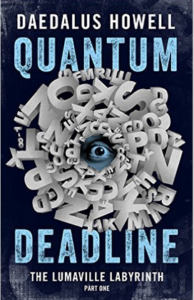Guest Blogger Daedalus Howell reveals a tried and true method to reach new audiences.
The revolution will be serialized. As it’s always been. Much of episodic entertainment, from our favorite shows on Netflix or premium cable to the summertime superhero blockbusters, are issued in discrete elements that comprise a whole story. Comic books have long functioned in this manner, ditto popular literature, which was once serialized in newspapers. And, of course, there’s the staggeringly popular Serial podcast, which not only popularized a new storytelling medium but so embraced the concept of serialization that it branded itself with it. Clearly, serialization is back, representing to some, a vanguard in publishing. It can also be an integral part of your creative process.
 This is what I’ve found creating Quantum Deadline, a sci-fi crime romp that comically explores the death of newspapers through the foggy lens of a reporter tripping through the multiverse. Like many authors, my project found its first iteration as a National Novel Writing Month novel — one November, I arranged 50,000+ English words in a manner that produced the general effect of a novel. Despite the fact that the result was an unholy (if occasionally inspired) mess, I remained committed to seeing it through the bitter end of a Kindle download.
This is what I’ve found creating Quantum Deadline, a sci-fi crime romp that comically explores the death of newspapers through the foggy lens of a reporter tripping through the multiverse. Like many authors, my project found its first iteration as a National Novel Writing Month novel — one November, I arranged 50,000+ English words in a manner that produced the general effect of a novel. Despite the fact that the result was an unholy (if occasionally inspired) mess, I remained committed to seeing it through the bitter end of a Kindle download.
I put it in the proverbial drawer through the winter to cool and found when I exhumed it the following spring, I was ready to rewrite it. That said, there is no “National Rewriting Your Novel Month” and I loathed the notion of working alone sans the esprit de corps I’d experienced with NaNoWriMo.
I tried. I failed. I had no sense of accountability or “ticking clock” to compel me back to the work. Not that I was enthralled with the prospects I perceived in the book, it’s just that, as a career-long newspaper columnist, I’d grown accustomed to a weekly deadline. And someone to enforce it. With a speculative, self-generated project like Quantum Deadline, there was neither a deadline nor an irate editor to make me deliver. That’s when I began to contemplate serialization. I needed to feel accountable and I needed a schedule — two aspects of serialization that I theretofore hadn’t realized were possibilities.
Moreover, I suspected serialization would allow me to “course correct” if I found that my readers were losing interest or recognize possibilities in the work that I hadn’t. I think of it as akin to The Lean Startup concept of creating a “minimum viable product” that allows for pivots between plot points.
“The fundamental activity of a startup is to turn ideas into products, measure how customers respond, and then learn whether to pivot or persevere,” writes Eric Reis, The Lean Startup’s main advocate and author of a popular business tome of the same name.
If we replace the term “startup” with the word “writing,” the path to serialization becomes self-evident. Instead of hunkering down, alone in the back of a Starbucks, the premise of releasing iterations of your work while refining it allows you the opportunity to grow and create community around it in the meantime.
The trick is to be responsive to the concerns of your readership rather than defensive. You’re creating a feedback loop, not a combat zone. You don’t need to completely alter the vision of your paranormal YA romance when your readership is flagging, nagging or otherwise bagging on your work. However, you do have the opportunity to make adjustments in the next installment (and retroactively as well — serial readers are very forgiving, I find, so long as you point to relevant changes that improve their enjoyment of the work).
Likewise, authors are advised to read Austin Kleon’s excellent book Show Your Work!, which extols the virtues of sharing your creative process as a means of cultivating an audience. Much in the same way film studios invite entertainment reporters on set to drum up interest in a film prior to its release, Kleon suggests sharing your process and inspirations as you create. This notion also dovetails nicely with “rewriting in public” through serialization.
Writing a serial not only creates both context and momentum for one’s creative output, it cultivates community with your work as its rallying point. Chapter by chapter, week by week, you steer us deeper into your creative world — a world we may not have seen were it not for the revolutionary resurgence of the serial. As Gil Scott-Heron said, “The revolution will put you in the driver seat.”
Note from Marlene: The “Now What” feature of National Novel Writing Month supports “the revision and publishing process. It’s an extension of our anything-goes, wombat-infused noveling philosophy, with the added aim of helping you fulfill your novel’s potential: from first draft to final.”
Daedalus will be the April 21 Writers Forum presenter, talking about, “Write Who You Know: How to Use Your Personal Life in Your Fiction And Memoir Writing Without Ruining Your Relationships.”
Daedalus Howell is the author, most recently, of Quantum Deadline. He hosts the Culture Dept. podcast, is a radio personality on KSVY and KSRO, hosts the TV show 707, and blogs for Men’s Health and Petaluma’s Rivertown Report. Otherwise, he’s at DaedalusHowell.com.